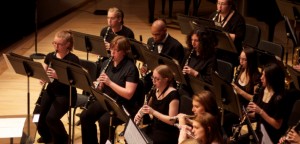On Oct. 25-26, the national Christian Fellowship of Art Music Composers (CFAMC) showcased works written by various modern composers and Houghton composition students in a series of six concerts. This was in conjunction with the CFAMC’s 19th annual conference, which has previously been held in other locations throughout the United States.

Mark Hijleh, associate dean for academic affairs and professor of composition and conducting, said that composition students had their works performed during the conference while having the opportunity to put on works by other composers; “the value of this experience for them cannot be overstated.” In addition, composers from around the country and a few from outside the U. S. who write music for opera, worship, and formal concerts attended and had their pieces performed by ensembles such as Symphonic Winds, Philharmonia and College Choir.
Last Friday evening’s concert contained pieces by modern composers, almost all of whom were in the audience. David Davies, assistant professor of composition and theory, and Mark Hijleh both had pieces performed as well. Attendees heard a wide variety of pieces, ranging from Michael Daugherty’s energetic composition Niagara Falls to Mason Bates’ Mothership, a work incorporating electronics that was commissioned by the YouTube Symphony. The audience gave lengthy ovations after each piece, especially noting Kelley Hijleh’s vocal accompaniment to Robert Denham’s Home. Kelley Hijleh said that she feels the way she can best serve living composers is by performing their pieces, and “if I feel called to serve living composers, I feel doubly called to serve living Christian composers.”
In regards to the conference’s purpose, Mark Hijleh said the CFAMC gathers annually in different locations “to meet and hear each other’s music, pray together, discuss the issues of our work and spiritual lives.” Mark Hijleh also mentioned that this is not just an organization, but also a ministry. The CFAMC’s mission, as stated on its website, is to “glorify the Lord Jesus Christ and help build His kingdom by encouraging Christian fellowship among its members in the context of their work and witness as composers of art music.”
Davies said, “My art is inseparable from my faith,” mentioning the fact that the CFAMC provides an intersection for Catholics, Protestants, and Orthodox Christians who share Davies’ conclusion but have taken different paths to get there. Talking about the types of music represented, Davies referred to the philosophy held by J. S. Bach, “who drew no distinction as a composer between his music composed for sacred or secular occasions.” Rather, Davies said the CFAMC desires to increase public interaction with Christian composers of “art music,” which is not necessarily what one might refer to as “sacred music.”
Kelly Van Kirk, a graduate student at the Greatbatch School of Music, said that the most important part of the conference for her was the “exposure to successful Christian musicians who are using their gifts not only to make a living but, more importantly, to bring glory to God.”
